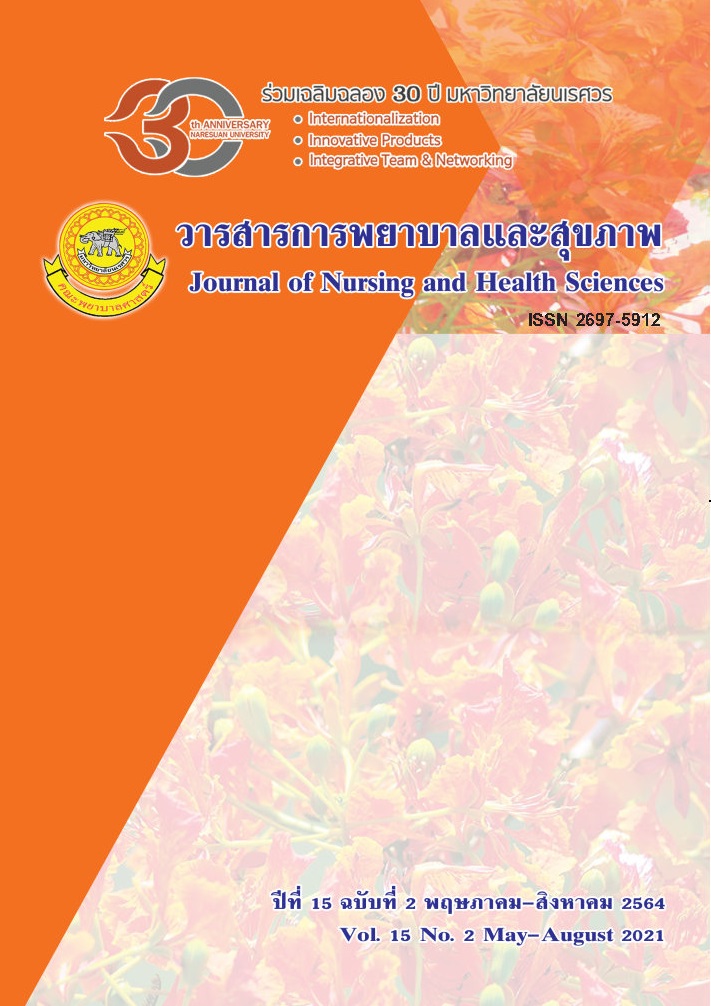Relationship between Health Belief and Prevention Behaviors of COVID-19 among Security Guards at Naresuan University
Main Article Content
Abstract
The objectives of this descriptive correlational research were to study health belief, prevention behaviors of Coronavirus Disease-19 (COVID-19) and determine the relationship between health belief and the COVID-19 prevention behaviors of security guards at Naresuan University. The samples of 128 security guards working at Naresuan University were systematic randomly selected by their identification number. The research instruments were the questionnaires of health belief and the COVID-19 prevention behaviors. The content validity indexes of the questionnaires were 0.95 and 1.0, respectively. The Cronbach’s alpha coefficients of the questionnaires were 0.82 and 0.87, respectively. Data were analyzed by descriptive statistics and Spearman rank correlation coefficient. The results revealed that the overall health belief and the overall COVID-19 prevention behaviors of the security guards were at the high level ( = 3.01, SD = .37 and = 2.59, SD = .35, respectively). The health belief had moderate and positive relationship (r = 0.31), and statistically significant (p < .001) with COVID-19 prevention behaviors of the security guards.
Article Details

This work is licensed under a Creative Commons Attribution-NonCommercial-NoDerivatives 4.0 International License.
References
Glomjai, T., Kaewjiboon, J., & Chachvarat, T. (2020). Knowledge and behavior of people regarding self-
care prevention from nevel Coronavirus 2019 (COVID-19). Journal of Nursing, Public Health, and
Education, 21(2), 29-38. [in Thai].
Jaide, C., Santati, S., & Kongsaktrakul, C. (2012). Factors related to child care workers’ behavior in
prevention of acute respiratory infection in child care centers. Ramathibodi Nursing Journal, 18(3),
-403. [in Thai].
Jitsuchon, S. (2020). The impact of COVID-19. Retrieved January 14, 2021 from tdri.or.th/2020/05/who-
are-affected-by-covid-19/ [in Thai].
Maiman, L. A., & Becker, M. H. (1974). The Health Belief Model: Origins and correlates in psychological
theory. Health Education Monographs, 2(4), 336-353.
Ministry of Health. (2020). The survey of COVID-19 prevention behaviors of Thai populations. Retrieved
January 14, 2021 from pr.moph.go.th/?url=pr/detail/2/04/14405/ [in Thai].
Montaisong, K., Kummabutr, J., & Thongbai, W. (2017). The factors predicting tuberculosis preventive
behaviors among the tuberculosis contacts in the Bangkok area and perimeter. Journal of the Royal
Thai Army Nurses, 18(supplement), 306-314. [in Thai].
Naresuan University. (2020). Practical guidance during the spread of COVID-19. Official document.
Phitsanulok: Naresuan University. [in Thai].
Ngwewondo, A., Nkengazong, L., Ambe, L. A., Ebogo, J. T., Mba, F. M., Goni, H. O….& Oyono, J. L. E.
(2020). Knowledge, attitudes, practices of/towards COVID-19 preventive measures and symptoms:
A cross-sectional study during the exponential rise of the outbreak in Cameroon. PLOS Neglected
Tropical Diseases, 14(9), 1-15.
Ongarj, P., & Ungcharoen, R. (2021). Self-protection behavior of COVID-19: A case study of students at
Kasetsart University, Chalermphrakiat Campus, Sakon Nakhon Province. Public Health Policy &
Low Journal, 7(1), 87-102. [in Thai].
Phitsanulok Provincial Public Health Office. (2021). The survey of COVID-19 prevention behaviors of
populations in Phitsanulok Province. Retrieved January 14, 2021 from www. Plkhealth.go.th
[in Thai].
Poonaklom, P., Rungram, V., Abthaisong, P., & Piralam, B. (2020). Factors associated with preventive
behaviors towards Coronavirus Disease (COVID-19) among adults in Kalasin Province, Thailand,
Outbreak, Surveillance, Investigation & Response Journal, 13(3), 78-89.
Soynahk, C., Kompayak, J., & Punthasee, P. (2018). A study of health belief model and the risk of Type 2
Diabetes in working muslim populations. Journal of the Royal Thai Army Nurses, 19(supplement),
-277. [in Thai].
Srisatidnarakul, B. (2010). The methodology in nursing research. Bangkok: U&I Inter Media. [in Thai].
Waehayi, H. (2020). Severity perception and preventive behavior on the Coronavirus disease-2019 among
youth at Sateng-Nok Subdistrict, Muang District, Yala Province. Academic Journal of Community
Public Health, 6(4), 158-168. [in Thai].
World Health Organization. (2020). Coronavirus disease (COVID-19) questions and answer. Retrieved
Jun 18, 2020, from https://www.who.int/thailand/emergencies/novel-coronavirus-2019/q-a-on-
covid- 19
Yamane, T. (1973). Statistics: An introduction analysis (2 nd ed.). New York: Harper & Row.


